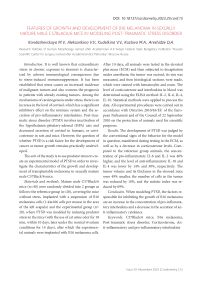Features of growth and development of B16 melanoma in sexually mature male C57black/6 mice in modeling post-traumatic stress disorder
Автор: Kondashevskaya M.V., Aleksankina V.V., Kudelkina V.V., Kozlova M.A., Areshidze D.A.
Журнал: Cardiometry @cardiometry
Рубрика: Conference proceedings
Статья в выпуске: 29, 2023 года.
Бесплатный доступ
It is well known that extraordinary stress or chronic exposure to stressors is characterized by adverse immunological consequences due to stress-induced immunosuppression. It has been established that stress causes an increased incidence of malignant tumors and also worsens the prognosis in patients with already existing tumors. Among the mechanisms of carcinogenesis under stress, there is an increase in the level of cortisol, which has a significant inhibitory effect on the immune system and the secretion of pro-inflammatory interleukins. Post-traumatic stress disorder (PTSD) involves inactivation of the hypothalamic-pituitary-adrenal (HPA) axis and decreased secretion of cortisol in humans, or corticosterone in rats and mice. However, the question of whether PTSD is a risk factor for the development of cancer or tumor growth remains practically undeveloped.
C57black/6 mice, b16 melanoma, post-traumatic stress disorder, corticosterone, antiinflammatory and proinflammatory interleukins
Короткий адрес: https://sciup.org/148327387
IDR: 148327387 | DOI: 10.18137/cardiometry.2023.29.conf.15
Текст статьи Features of growth and development of B16 melanoma in sexually mature male C57black/6 mice in modeling post-traumatic stress disorder
Research Institute of Human Morphology named after Academician A.P. Avtsyn Federal State Budgetary Institution “Russian Scientific Center for Surgery named after Academician B.V. Petrovsky”, Moscow, Russia
Introduction . It is well known that extraordinary stress or chronic exposure to stressors is characterized by adverse immunological consequences due to stress-induced immunosuppression. It has been established that stress causes an increased incidence of malignant tumors and also worsens the prognosis in patients with already existing tumors. Among the mechanisms of carcinogenesis under stress, there is an increase in the level of cortisol, which has a significant inhibitory effect on the immune system and the secretion of pro-inflammatory interleukins. Post-traumatic stress disorder (PTSD) involves inactivation of the hypothalamic-pituitary-adrenal (HPA) axis and decreased secretion of cortisol in humans, or corticosterone in rats and mice. However, the question of whether PTSD is a risk factor for the development of cancer or tumor growth remains practically undeveloped.
The aim of the study is to use predator stress to create an experimental model of PTSD in order to investigate the characteristics of the growth and development of transplantable melanoma in sexually mature male C57Black/6 mice.
Materials and methods . Mature male C57Black/6 mice (n=40) were randomly divided into 2 groups as follows: the reference group (n=20), covering the mice without stress, implanted with a suspension of B16 melanoma cells (1.44x106 cells per mouse in the area of the left scapula) and the experimental group (n= 20), where PTSD was modeled by inducing predator stress in the mice (with the use of cat urine odor for 10 min, within 10 days, later under the normal vivarium conditions for 14 days), after which the experimental animals were implanted with B16 melanoma cells.
After 10 days, all animals were tested in the elevated plus maze (ECM) and then subjected to decapitation under anesthesia; the tumor was excised, its size was measured, and then histological sections were made, which were stained with hematoxylin and eosin. The level of corticosterone and interleukins in blood was determined using the ELISA method: IL-2, IL-6, IL-4, IL-10. Statistical methods were applied to process the data. All experimental procedures were carried out in accordance with Directive 2010/63/EU of the European Parliament and of the Council of 22 September 2010 on the protection of animals used for scientific purposes.
Results . The development of PTSD was judged by the conventional signs of the behavior for the model in question, manifested during testing in the ECM, as well as by a decrease in corticosterone levels. Compared to the reference group animals, the concentration of pro-inflammatory IL-6 and IL-2 was 40% higher, and the level of anti-inflammatory IL-10 and IL-4 was lower by 14% and 30%, respectively. The tumor volume and its thickness in the stressed mice were 49% smaller, the number of cells in the tumor was reduced by 18%, and the mitotic index was reduced by 69%.
Conclusion . When modeling PTSD, the factors responsible for inhibiting the growth of B16 melanoma are an increase in the concentration of pro-inflammatory interleukins and a decrease in the secretion of anti-inflammatory cytokines.


